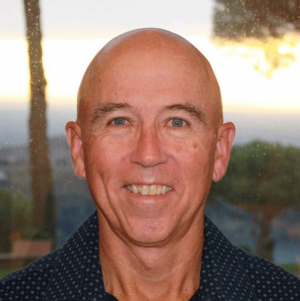Peter MALONE
King Otto
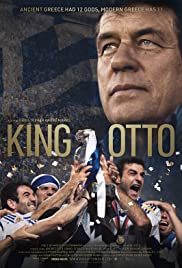
KING OTTO
US/Greece, 2021, 82 minutes, Colour.
Otto Rehhegel.
Directed by Christopher Andre Marks.
Yes, this is a bit of history. But, no, it does not take us back into the European past when kings were called Otto. Rather, this is the story of Star German football player and coach, Otto Rehehgel.
For football fans, this is an obvious must. For Otto Rehhegel fans, they will not be disappointed. For those who don’t follow football or the World Cup in great detail, an enjoyable sports film. And, for those who do not follow soccer/football at all, but are devoted to their own codes, the Rugby and Australian Rules, they probably will not be sorry if they happen to see King Otto.
But, for Greek audiences, whether in Greece or in the Greek communities around the world – probably more than a must!
The film introduces an interview with Otto Rehhegel, filmed in the year that he turned 80. (Those in who enjoy historical flashbacks, there is extensive footage of Otto’s life during World War II, the bombing of his native city Essen and, his skills as a child with sport, his spectacular career as a German player.) He is certainly good advertisement for a healthy sports life. The interview material is interspersed throughout the film along with the interviews with his assistant, Greek origins, growing up in Germany, serving as a football agent, able to bridge the language gap between Otto and the Greek players. He is a pleasantly, genial personality. And, there are quite a number of interviews with the Greek players reflecting on their experience with Otto, from hesitation, wariness, to admiration. And there is a lot of television footage of the period.
And, of course, there is a great deal of play included in the film, much of it exhilarating for the fans.
However, the drama of the film is the story of the Greek national team, certainly considered underdogs (or even a lower level). While there were talented players, they were haphazard in their behaviour and training, often more interested in social life, the local population not particularly interested in then.
l
When the Greek football management hired Otto Rehhegel, it was something of an achievement – however, not working well initially. Otto had no Greek. And he had the Germanic attitude. Which included not immediate empathy for Greek culture and the more relaxed Greek way of life. He made the wise choice in hiring his assistant who is able to translate (not literally) Otto’s commands. Gradually, there was a building up of confidence, teamwork, especially for the entry into the 2004 World Cup.
And, here is the full drama of the film, the first match against Portugal, the host country, and a win. And then further matches, France (with Zadine and Ronaldo), Czech Republic. All fans would know the result, and nonfans are anticipating the impossible. And, this is what happens in the final match, once again against Portugal. Rejoicing, national pride – and the realisation of how significant in European countries, at least, is this kind of achievement in sport.
This is what King Otto offers as a film – and what it achieves.
Tres Veroes/ Three Summers
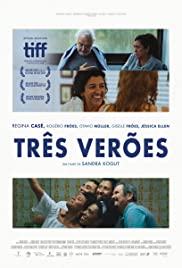
TRES VEROES/ THREE SUMMERS
Brazil, 2019, 94 minutes, Colour.
Regina Case, Rogerio Froes, Gisele Froes.
Directed by Sandra Kogut,
The three summers are those of 2015, 2016, 2017 leading up to New Year’s Eve for 2018. The setting is the coastal city in Brazil, with the combination in Rio.
This is an entertaining film and the credit goes (apart from the screenwriter and the director) to the star, Regina Case, a veteran of Brazilian cinema and television, certainly a larger-than-life personality on screen, coming into her mid-50s at the time of the making of this film. She is immediately engaging, capturing our attention, even affection.
She is the housekeeper, Mada taken away for interrogation, the staff upset, no pay. But, the ever-inventive Mada works are quite a number of solutions, first of all the staff enjoying this stocked food for an intended party,, arranging land of his garage sales…
So, what can there be in the third summer? Actually, that something of an anti-climax, a great deal of attention is given to the filming of a commercial program in the house, one of Mada’s brainwaves (along with a rather revived Lira) to make the house available for a kind of AirBnB. While this is amusing, and, eventually, Mada has to take a central role though is, initially, surprisingly ineffectual, she does win through.
But, on the principle that good things come to those who wait, Mada and the staff do come into eventual good fortune, celebrating in Rio on New Year’s Eve, high hopes for 2018.
Easy entertainment, an engaging central performance, a lively supporting cast, and quite some implicit/explicit criticism of corruption amongst the upper classes, widespread fraud, in Brazilian society.
- A Brazilian story? Universal appeal? Characters? Issues?
- The coastal setting, the sea, the beaches, the cliffs? The home, lavish interiors, artwork? The swimming pool? The contrast with Mada’s kiosk? The musical score? Moonlight Sonata?
- The structure of the film, the focus on the three summers, 2015, 2016, 2017 and New Year’s Eve for 2018?
- The effect of the structure, the episodes at each December, the audience supplying what went on in between?
- 2015, the focus on the wealthy, the party, the guests, the artwork? The servants and their work behind the scenes? Mada and her running the household? The contrast with 2016, the revelation of the fraud, wife and son escaping, husband in jail? His father? The focus on the servants and their reactions? Issues of pay? The kiosk? Blocked? Police investigations? garage sales? 2017, the plans for the servants to survive, B&B, Mada and her collaboration with Lira? The making of the film? The move to Rio? The new apartment, New Year’s Eve, the fireworks, hopes for the New Year?
- Regina Case as Mada, her age, appearance, housekeeper? Her dominant presence? Audiences warming to her? Her continual joy? Liveliness? The detailed managing of the house? The initial party and the preparations? The kitchen, the servants? The preparations and decorations, technical? Upkeep? Her own story and wanting the money for the land for the kiosk, her ambitions? Her familiarity with things online, photos, films, sales, Instagram…? Audiences identifying with her? And the “downstairs” staff?
- A year later, still exuberant, but the shock of the police arriving, the food ordered and the disappearance of Marta, the work of the servants, preparation, cancellations? The response to the police, Mada driven off, the questions about her funds, Edgar buying her phone after previously giving her the money for the kiosk, the phones in her name? Her coping with the difficulties? The food, the servants enjoying it? The sales, the customers? The kiosk and the barrier in front of it?
- The importance of Lira? Seen at the beach with his son, the flowers on the water, in memory? His age, weakened state? The support of his son? Trying to persuade him to come down and see the video of his wife teaching his grandson piano? Gradually coming? His disillusionment with his son’s arrest, that he was a thief, his memory of reading his son books but his son not interested? Irritated by Mada? Relying on her? The scenes of the beach with the flowers and making wishes? His moving to Rio? His gradually coming to terms with what happened? The year passing, his still being in the house, the flowers in the water? The discussions with Mada, knowledge of the Internet, born too early! Their work for the planning of the B&B? His death and the pathos?
- The portrait of the wealthy, Edgar at the party, his father, alienation from his wife, pride in his son? On the phone, the deals? Arrested, in jail? His wife, her snobbery, the artwork, giving away her clothes to Mada? Leaving with her son and disappearing?
- Making the film, the actor and his awkwardness with his lines? The setup, the couple and the talk about Christmas, the little girl, the director and his exasperation, the continuity girl, make up and costumes? The snow? The decision to cast Mada, the wardrobe? Talking to camera, mistaking her lines, the others encouraging her? Eventually her success in telling such a sad story?
- The staff in the house, the young women, their work, not paid, their exuberance, friendship with Mada? Emerson and his technical work, going for the swim? Eliseo and finance? The other members of the staff?
- The issues of finance, the move to Rio, the death of Lira, Mada inheriting his apartment?
- An invitation for the audience to go to Brazil, share the sunshine in Christmas, share the exuberance, be aware of the widespread financial corruption and its consequences?
Prisoners of the Ghostland
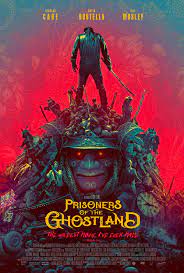
PRISONERS OF THE GHOSTLAND
US/Japan, 2021, 103 minutes, Colour.
Nicolas Cage, Sofia Boutella, Nick Cassavetes, Bill Moseley, Tak Sakaguchi, Charles Glover.
Directed by Sion Sono.
This is exotic science-fiction, science-fantasy, futuristic, apocalyptic, to say the least. It is one of those films that one could say it has to be seen to be believed.
The director is Sion Sono, a poet who became a film director, quite prolific in a variety of styles. In fact, this enterprise is an exercise in a prolific variety of styles.
It is as if we were transported to a variation on Westworld, a Western town in Japan of the future, looking like a film set, inhabited by strange mixture of Americans and Japanese, sometimes robotic in their actions, the governor (Bill Moseley) a complacent exploitatively arrogant leader, set up with an elaborate harem of sex slaves (introduced in a dream sequence of escape) and protected by a samurai warrior. Later, audiences will probably thinking a lot about the Mad Max world, even to the song “we don’t need another hero” (remembering Tina Turner in Mad Max Beyond Thunderdome). But, in fact, they really do – and he is the most unlikely hero.
He is played by Nicolas Cage. Cage has made a later career playing hyped up manic heroes and villains – and this one is up there amongst the top! The first time we see him he is brandishing guns and shouting, along with his friend Psycho, robbing a bank. But, he is captured and imprisoned. Eventually, the governor sets him to find one of the missing women, allegedly his niece, Bernice (Sofia Boutella), dressing him in a powerful suit but with explosives in key places to control him (and some of them do explode!).
In a way this is a no-holds-barred creation, drawing on all kinds of action genres, enjoying film play with its conventions. It draws on Japanese myths. It draws on Hollywood action. It draws on the saviour hero figure, unlikely as he may seem. There are martial displays, swordfights.
The Hero makes his way to a remote and desolated community where some of the escapees have taken refuge even though they are in catatonic states. The community has quite a number of mutant characters. This is post-Apocalyptic, nuclear themes, an accident, waste and camp termination. And there is a white literate Guru advising the group, but pessimistic that they will ever escape.
The Hero, despite the explosions and injuries to his body, rescues Bernice, leads an uprising, makes his way back to confront the governor for, not exactly a high noon shootout, but a deadly confrontation and samurai sword fighting.
So, a wildly imaginative adventure, perhaps a bit much (well, not perhaps, perhaps) for the average audience but for those who enjoy going beyond conventions, and more than a touch of the weird.
Eternal Summer
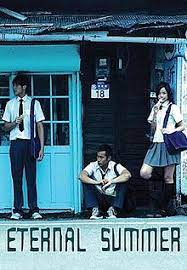
ETERNAL SUMMER
Taiwan, 2006, 93 minutes, Colour.
Hsiao-chuan Chang, Ray Chang, Kate Yeung.
Directed by Leste Chen.
This is a story of two young boys, young, growing into adolescence, at age 18 and the transition from school to college and adult life. One is Jonathan, a conscientious little boy at school, the other Shane, attention deficit, always in mischief, playing up. Teachers asked Jonathan to be with Shane and be a good example and influence on him – which happens.
In the final year at school, Jonathan works on the paper with a fellow-student, Katie. She is attracted, suggests they skip school and visit Taipei, going to a hotel at night, sexual advance, Jonathan stopping, the beginnings of realisation of his sexual orientation. In the meantime, Shane doesn’t study but excels at sport. Jonathan is wary with Katie. Shane is attracted, follows her, she comes to watch him play sport, they become friends.
Jonathan becomes more remote, upset with Shane, studying for exams. There is a surprising sequence, presented too briefly for explanation, where Jonathan is picked up by an older man and they have a sexual encounter.
Tensions between the three. Then another surprise sequence, this time where Shane goes home with Jonathan and they have a sexual encounter – Shane desperately needing Jonathan and his friendship and so deciding to supply Jonathan’s sexual needs in order to retain his friendship.
In the final sequence, with the three, their recriminations, a fight, some kind of reconciliation and peace and a final glimpse of the three sitting together. Their future?
- The title? Yet the time span of months? An image of not growing older?
- Taiwan cinema, sexuality and orientation themes, 2006?
- The country town, homes, school, sport, studies? The beach? Knowledge? The visit to Taipei, the train rides? The context for the three young central characters?
- The effect of the screenplay, audience difficulties in appreciating what time has passed, long or short? Sequences cut short and not expanded, not explained, for instance the older man picking up Jonathan? The development of the relationship between Katie and Shane?
- The opening, the three, Katie with the injury to her head? The two young men? The transition to childhood, the little boys, playing together? At school, Jonathan and his good behaviour, conscientious? Shane, attention deficit, playing up, cutting the little girl’s hair, sitting out in the field at his desk, punishment? The teacher with the children singing, forbidden to look out the window at Shane?
- Shane’s mother, her concern about his development, the discussion with the teacher, the choice of Jonathan to be his companion, to look after him, to help Shane be his better self? Jonathan and his reaching out to Shane, situations, with the other children, Shane and sport?
- The irony when Jonathan finally tells Shane that he was ordered to look after him and regretted it? And the further irony with Shane telling Jonathan that he knew that had been ordered to look after him?
- Final year at school, Jonathan and his work on the paper with Katie, her suggesting they go to Taipei, in the city, the hotel, the sexual advance, Jonathan and his reluctance? The return home?
- Jonathan, final realisation of his sexual attraction? Secrecy, cutting himself off? The encounters with Katie? With Shane, Shane and his best friend, ambiguity in the relationship? His studies, not doing well in have to do more exams? Shane and his excelling at sport? Enjoying Jonathan’s company? Teasing him, preventing him studying? Jonathan and his hostile reactions?
- Shane, the encounter with Katie, initial hostility, mellowing, her demanding that he pass exams to go to university, Shane following her, her going to see him play, the buildup of the friendship, not telling Jonathan?
- Time passing, Jonathan and his being by himself, sitting on the bench, the older man and the pickup, the sexual encounter, in the bath, the aftermath?
- The ball, Jonathan reluctant to go, Shane insisting, Katie’s presence, the dancing, the revelation of the relationship?
- The aftermath, at home, Shane and the sexual approach, the effect on Jonathan? Interpreting Shane’s behaviour as wanting to continue friendship with Jonathan and his being willing to give Jonathan what he needed, sexually?
- At the beach, the fight, truth telling, Katie present? Her being knocked over?
- In the final scene again of the three together? The audience sharing their experiences, the past, changes, and possibilities for the future?
Eiffel
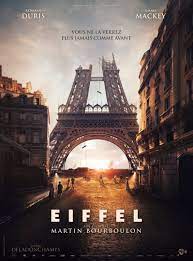
EIFFEL
France, 2021, 108 minutes, Colour.
Romain Duris, Emma Mackey, Pierre Deladonchamps, Armande Boulanger.
Directed by Martin Bourboulon.
There was a time when Paris was not dominated by the Eiffel Tower. This portrait of its engineer and builder, Gustave Eiffel, takes us back to that time, the 1880s. It is the story of the planning and the building of the Tower, but it also emphasises, almost equally, a romance story between Eiffel and the love of his life, Adrienne, 20 years earlier, how it was broken by her family, and her reappearance of the time of the building of the tower.
Romain Duris has become a significant figure in French cinema and fits the role of Eiffel perfectly. French actress, with British background, Emma Mackay, is a striking presence as his love, Adrienne. At this time, Eiffel was a widower with three children, constantly supported throughout his work by his eldest daughter, Claire.
The early part of the film establishes Eiffel’s credential as a civil engineer, a sequence at the dedication of The Statue of Liberty, the tribute to the French, Eiffel receiving an award from the American government. To further illustrate his credentials, there are flashbacks to his work as a bridge designer and builder in the 1860s, especially a bridge over the river Garonne, his working in metal, even writing a handbook on the topic.
With this established, a French government situation arises as to the choice of a significant landmark for the 1889 Universal Exhibition. Eiffel and his company win the commission and we see the workings of Eiffel’s mind, his imagination, working on a model of the tower, altering it, planning for it to go 300 feet above Paris. One of the advantages of the film is that there are quite a number of sequences, quite elaborate in detail, of the digging of the foundations, of the work of the artisans, of the building up of the metal base, the challenge to reach the first stage, Eiffel and his involvement, his financial assistant, public opinion beginning to move against the tower, protests and demonstrations, vilification is, political interventions.
And, in the meantime, Adrienne, the love of the past, now a married woman, arrives in Paris and meets Eiffel again. The meeting, the various occasions of encounter, regrets from the past, explanations of what it happened, the hostility of Adrienne’s husband, are all presented in the French romantic traditional style.
Which means then that this can be called a romantic portrait, romanticising, in some ways but deservedly, the ingenuity and skills of Eiffel, especially with the achievement of the tower, but also romantic in the love, self-sacrifice, humanity and passion of love and disappointment.
Tres francais.
- The status of the Eiffel tower? French monument? World Monument?
- Audience knowledge of Eiffel, the planning and building of the tower, its opening in 1889, visitors ever since?
- The 1880s, costumes and decor, visual style? Paris, homes, official offices, restaurants and city life, the site of the tower? The stages of building? The interlude with the Statue of Liberty? The flashbacks to the 1860s, the countryside, the town, homes, bridges and building sites? The river? The musical score?
- The portrait of Gustave Eiffel? Age, experience, engineering, the use of metal on bridges, his writing the book? His company, the achievement with the Statue of Liberty, the American award? His staff, his assistant, financial issues? The World Fair, the government and the ambitions for a striking monument? The various plans, designs of towers? Eiffel offhand, seeing the tower, wanting to compete, the details of seeing him change the design, the submission to the competition, his winning?
- Eiffel as a personality, strong minded, driven, his work on the tower, the continued plans, the site and its vastness, underground, the foundations, the danger from water on the river, laying the foundations, building up, the task of achieving the first level?
- Public opinion, praising him when he won the award and the commission, turning against him, the media, gossip? Demonstrations? His defiance, determination to build?
- Eiffel, the background of his marriage, his children, his daughter and her continued support?
- The details of Eiffel working at his desk, the design, changes? The detail of work on the site, audience immersed in the building and development, the difficulties? The workers, payment, financial difficulties, Eiffel and his assistant, talking to the men, the appeal, promises? The continuing the work?
- The flashbacks to 20 years earlier, the bridge, Eiffel young, the encounter with Adrienne, her parents, society, his falling in love, her teasing him, love, engagement? Her parents forbidding it? Wanting to marry someone else? Sending her away, the father condemning Eiffel?
- Adrian, 20 years, her marriage, her husband and his business interests, connection with Eiffel? Power? The return, the effect on Eiffel, tentative meetings, falling in love again, the relationship? The approval of his daughter? Adrienne, her character, defying her husband? The husband, conniving against Eiffel? The ultimatum? Adrienne leaving? The effect on I felt?
- The completion of the tower, the acclaim for Eiffel, Adrienne in the crowd?
- As a film, the combination of the achievement of the Eiffel Tower permeated with the romance story?
No Time to Die
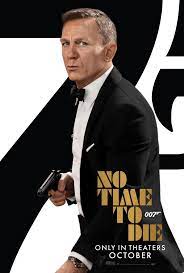
NO TIME TO DIE
UK, 2021, 263 minutes, Colour.
Daniel Craig, Lea Seydoux, Rami Malek, Lashana Lynch, Ralph Fiennes, Ben Whishaw, Naomie Harris, Rory Kinnear, Jeffrey Wright, Billy Magnusson, Christoph Waltz, David Densik, Ana de Amas.
Directed by Cary Joji Fukunaga.
Ready for release when covid struck in 2020. Then there were continuing changes of dates in release, hoping for return to cinemas. After more than a year and a half, confidence returned and here we have No Time to Die at the end of 2021.
A lot of anticipation? Worth the wait? Yes.
As usual, there is a 20 minute segment prior to the title coming on screen, the old introduction to James Bond shooting, the familiar theme (almost 60 years old), but, rather than go into action there are some domestic sequences, the focusing on a little girl, Madeleine, and talk about her killer father. And the action begins, a home invasion, a mysterious masked and pock-26 faced killer pursuing Madeleine on the ice – and then the transition to more recent times, and Madeleine and Bond together in a beautiful Italian mediaeval city, mountainside. Is this the James Bond we know? Yes, older, quieter, happy with Madeleine? But… action comes into play, car chases, explosions, fears and villains, Bond’s car revealing its automatic weapons… Has there been betrayal? And then the credits come!
This film, Daniel Craig’s last as Bond, his all the right buttons. And then some! And then some more!! And keeps a twist or to until the final moments. The posters have a catchy injunction: No Time for Spoilers!
Actually, the action takes place five years after the opening credits, Bond, living like Ian Fleming himself, in Jamaica. But, even though he is no longer 007 (and Lashana Lynch, tough, no holds barred, now has his designated number), M and Company (Ralph Fiennes, Naomie Harris as Moneypenny, no longer secretary but active agent, Q – who gets quite a lot of screen time and action – Ben Whishaw, and Rory Kinnear as the hesitating Tanner) all become involved.
As does Felix Leiter and the CIA (Jeffrey Wright as Leiter for the third time), with a giggling assistant, Billy Magnusson, who will have much more to do with the plot).
In the meantime, we have seen a mad scientist, David Densik, with elaborate DNA experiments and technology, his lab invaded, his being taken prisoner, transfer to Cuba – and, both the UK and the US want him taken. So, off from Jamaica to Cuba – and to several action fields beyond.
The Bond films have always been wonderfully in their range of locations and scenery. Same here.
Christoph Waltz turns up as Blofeld in Belmarsh prison but still up to no good – and some interesting plot twists here… But, this time he is not the main villain, he is literally unmasked as Luyitsifer Safin (should there be an Oscar nomination for inventive character names!), Rami Malek after his Oscar-winning turn as Freddie Mercury.
So, rescue operations, the menacing Safran and his hold on Madeleine, challenging Bond, defying him – and a buildup, as in so many of the earlier Bond films to a mysteriously elaborate plant on a remote island with a desperate countdown to explosion.
Daniel Craig has done a credit to James Bond – not suave like Sean Connery or Pierce Brosnan, not jocose like Roger Moore, his own man, straightforward, serious, not necessarily realising the humorous content of the quips that are part of his screenplay dialogue, but tough, committed, and, still master of the fight. Once more the world is saved – and we are promised that James Bond will return. And pages and social media sites forever speculating on who it will be.
- James Bond after almost 60 years? The range of stories? The range of styles? The range of actors? Daniel Craig and his final film?
- A film for the 2020s? Changes in expectations of action adventures? Of the Bond hero? Settling him down? Relationships? The personal? Change of attitude towards his 007 status? His being drawn into action again? The opportunity to see him with Blofeld? And a new villain? But the same kind of ending – split second timing, dangers, the big plant…?
- The opening, the familiar image, the Bond theme? The transition to the theme song? The musical score throughout? The human story, Madeleine, her mother, the threats from the masked man, the death of her mother, his anger at Blofeld, the effect on the little girl? The transition to the adult Madeleine, her relationship with Bond?
- Bond, age, experience, love for Madeleine? The beauty of the Italian city of Matera? Their idyllic life, love? His wariness? The attack on Bond, his memories of Vespa, going to her grave, the explosion? Suspicious of Madeleine? The thugs, the elaborate chases, the car rising high, Bond going over the bridge, the car, its armour, guns?
- Five years passing, Bond in retirement in the West Indies? Being called out of retirement, the visit by Felix Leiter, suspicions of Logan Ash? Felix, his personality, trying to recruit Bond? Bond agreeing, going to Cuba, the episode with Paloma, her glamour, age, in training, her skills with arms and fighting, the humorous touch?
- In London, M, the appointment of the new 007, female, ethnic background, her interactions with Bond? M, problems, Miss Moneypenny and her becoming an agent? Q., at home, domestic, yet all the devices, helping Bond? Tanner, his work in the office, his scepticism? And, ultimately, their all being present to supervise the final action?
- The laboratory, the situation in London, the scientist, the plan, DNA, recognition? The attack on the laboratory? Mayhem? The capturing of the scientist? Secure, in Cuba, with the connection to Blofeld? Working for Safing? Seeing him in action, the pursuit, dangers, the final chase, his death?
- The experiments, M and his concern, DNA, recognition, surveillance? Dangers?
- Bond, his visiting Blofeld, Blofeld in jail, memories of the past, taunts? The past confrontation with Safin? The irony that Madeleine was his daughter? His death?
- Safin, bond villain, wealthy, living in a remote area, the island, henchmen, plans for the DNA? Revenge against Blofeld? His face and disfigurement?
- Madeleine, her work, new life? The encounters with Blofeld? Safin taking her, the threats, the dangers? The revelation of her daughter, meeting Bond, denying that the girl was his daughter? The reality? Blofeld’s granddaughter, Bond’s daughter?
- Building up to the ultimate showdown, the rescue of Madeleine and her daughter? Bond, M and the team? The plant, the timing to shut it down, confrontation with Safin? His death?
- And the shock of Bond’s death? But the promise that he would return?
Tim Norton SVD appointed an auxiliary bishop of Brisbane
Tim Norton SVD appointed an auxiliary bishop of Brisbane
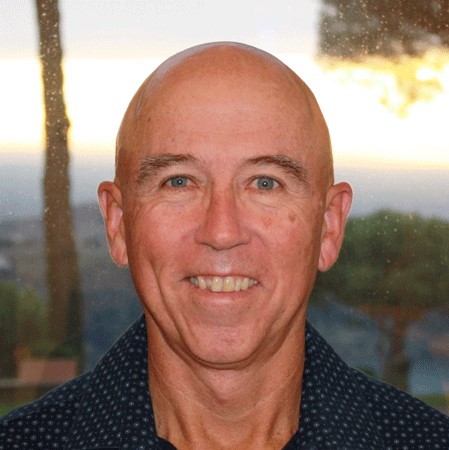
One is tempted to headline, “First Graduate of Siloam, the Heart of Life Centre’s Spiritual Direction Program, to be appointed Bishop”. Tim Norton also did his studies at the Yarra Theological Union.
From the Bishops Conference:
Pope Francis has announced that Society of the Divine Word priest and former CRA vice-president, Fr Tim Norton, will become an auxiliary bishop in the Archdiocese of Brisbane.
Fr Tim, who is currently in ministry in Italy, will early next year join Auxiliary Bishop Ken Howell in supporting Archbishop Mark Coleridge in serving the Catholics of Brisbane Archdiocese.
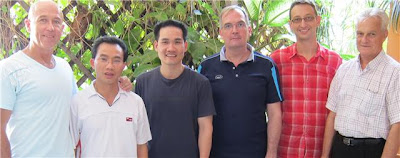
SVD in Thailand
Born and raised in Sydney, Fr Tim made his first profession in 1986 and was ordained to the priesthood in 1991. He describes several years of religious formation and priestly ministry in Mexico as “very formative for him”.
Since June 2020, Fr Tim has been working full-time with consecrated women and men promoting interculturality, something his order – commonly known as the Divine Word Missionaries or SVDs – are renowned for, including in Australia.
Fr Tim said ministry to multicultural communities is an important way his order is already involved in Brisbane Archdiocese. While head of the Australian province, he worked with Archbishop Coleridge to establish a Divine Word Missionary presence in two parishes.
“The SVD are active in the parishes of Inala and Kingston-Marsden, both very multicultural, and therefore places where the SVD confreres do their best work,” he said.
Fr Tim also worked with the local St Vincent de Paul Society in arranging for one of the order’s properties in Brisbane to serve as a shelter for people fleeing abusive relationships.
In almost 40 years of ministry, Fr Tim has also held key roles in Divine Word Missionary seminaries and has spent most of the past eight years in Rome running renewal programs for priests and brothers.
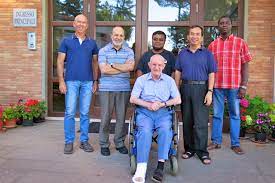
Nemi, Italy
He served as vice-president of Catholic Religious Australia from 2008 to 2010, in which capacity he attended meetings of the Australian Catholic Bishops Conference as an observer.
He said he has spent the brief time since learning of his appointment trying to process the move.
“It is indeed difficult to imagine myself as anything other than an SVD,” he said. “So, for the last two weeks, I have been trying to think of myself as a member of the ACBC and the Archdiocese of Brisbane, who, as an SVD, will bring a focus on culture and mission that may be helpful.”
He said he would bring to his ministry in Brisbane “an intense interest in culture, and the mission of God in the world, whatever shape or form that may take”.
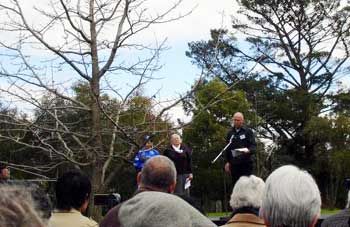
At the spirituality house in Boronia when Provincial
Fr Tim spent time before and after ordination living and working with people in Sydney who live on the streets, struggling with mental illness and addiction. He trained as a physiotherapist before entering religious life, and he continues to see that as part of his ministry.
Archbishop Coleridge said Fr Tim’s appointment was “in some ways surprising”, but said he “brings to the ministry of bishop many gifts and experiences required now more than ever as the whole Church seeks to become more missionary”.
“He will make a real contribution not only locally in Brisbane and Queensland but also nationally and internationally,” Archbishop Coleridge said.
The date for Fr Tim’s ordination to the episcopate is not yet known, but it will be in 2022.
Army of the Dead
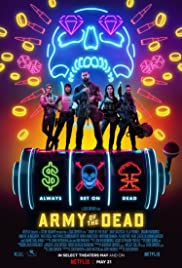
ARMY OF THE DEAD
US, 2021, 149 minutes, Colour.
Dave Bautista, Ella Purnell, Omari Hardwick, Ana de la Reguera, Theo Rossi, Matthias Schweighofer, Hiroyuki Sanada, Garrett Dillahunt, Tig Notaro.
Directed by Zack Snyder.
Who said that zombies were dead? Well, of course they are – but, after all the zombie films in recent years, is the zombie genre dead? Well, no. Here is an Army of the Dead. And they are on screen for 2 ½ hours!
In 2004, Zack Snyder (later to come to prominence and controversy with 300 as well as the Superman, Batman and Justice League sagas), did a variation on the classic zombie films of George A. Romero (Night of the Living Dead…). This one was Dawn of the Dead.
With this new film, it is not a remake of a Romero story but, obviously, the influence is there while there are many variations on the theme.
Released through Netflix, the bloggers instantly went into action during May 2021. Fans proclaimed this is a masterpiece, inventive and creative. Non-fans (and trolls) went to work condemning it for its lack of originality, for cramming all kinds of conventions into a long (and for them, boring) zombie rising.
Clearly, this is a film for those who enjoy the zombie genre. It is graphic in its presentation of the zombies, the gory deaths turning humans into zombies, some slashing, shooting, splattering of pursuing zombies. The film is for those who have this kind of splatter-tolerance (or eagerness).
There is a variation on the zombie theme. The zombies still live and doing their walk of the dead pursuit. However, they are living a kind of life, with some intelligence, having a leader who rides on a horse, a leader who has a queen. (There is also an infected hybrid Tiger on the prowl).
The opening shows a couple married in Las Vegas distracted by sex, crashing into a huge military convoy – releasing the zombies, who create mayhem (vividly displayed) in Las Vegas which then has to be walled off, quarantined, plans for nuclear warhead to be dropped on the city to eliminate the disaster.
And then the heist narrative is introduced, a Japanese businessman rounding up Scott (former wrestler turned actor, Dave Bautista) and his contacts, men and women, who can get into Las Vegas, combat the zombies, open a safe in the basement of a hotel where millions of dollars are stashed. So, the film becomes something of a mission impossible, or something of the 21st-century Dirty Dozen invasion. The dozen is quite a motley crowd, a couple of mercenaries, a timid German safe cracker, a sleazy government official (so he says), some warrior women, and even Scott’s daughter who is also on a rescue mission.
Which means then lots of combat, some doublecrossing, the opening of the safe, the retrieval of the money, the threats from the zombies.
Actually, a subtitle might be that one from the Agatha Christie story, And Then There were None…
So, who escapes, what about Las Vegas, any survivors? Any indications that there could be a sequel? Of course, yes.
- The continued popularity of zombie films? Especially from the 1960s? The work of George A.Romero? Zack Snyder and his remake of Romero’s Day of the Dead? The influence here? Going beyond?
- A different imagining of zombies? The infections, the attacks on humans, yet having lives, banding together, the leader and his queen, her pregnancy?? Self-protective, aggressive?
- This context for the heist narrative, the vault in Las Vegas? And a variation on a military operation, a 21st-century Dirty Dozen? And the theme of, And Then There Were…?
- The familiarity of the plot? Taking up various themes from horror films? The emphasis on gore, the explicit gore developed over the decades? Graphic? And the special effects?
- The prologue, the couple married in Las Vegas, sex, the crash, the military carrying the container with a zombies, the banter with the drivers, the crash and explosions, headquarters, the warnings, the military pursued, transformed? The visuals of the vampire escape, in Las Vegas, the mayhem? The walls around Las Vegas? Isolated? The plan to drop the nuclear bomb?
- Scott, seen in the introduction fighting the zombies? His work, his having to kill his wife, his daughter witnessing this, his nightmares, the years of antagonism? His range of friends and associates?
- The Japanese entrepreneur, the government, proposing the job, the safe and the money? The deal, payment?
- The recruiting of the team, Scott and his connections, the friendship with Vanderohe, with Mikey Grossman, their past exploits, their characters? Maria, the past association, a link with Katie? The helicopter pilot? The safe breaker? Lilly, the Coyote, on guard, the clash with Katie? Martin, representing the government, his insisting on his presence? The buildup of the detail of the team? The tests, the training?
- Burt Cummings, his military role, accosting Maria and Katie, the threats, the sexual attitude? Lilly choosing him as an extra member of the team, the deal with the zombies, his being sacrificed, as punishment for his predatory behaviour? His torment? The finale and his final confrontation with the women?
- The situation in Las Vegas, the leader, his queen, the other zombies and their following him? The presence of the guarding Tiger, contaminated? The leader and his riding the horse?
- The team going in, the deal with the zombies, going to the hotel, the fight and the killing of the zombies, the need to kill the brain?
- Arriving at the hotel, the plan with the helicopter, Marianne Peters, refuelling, ready? The fight to get into the area of the safe, the traps guarding the safe, using a zombie to test the traps? The quiet, the expert, 30 minutes, opening the safe, the money, putting it in bags, to transfer to the helicopter?
- Katie, a reason for going, to rescue the women? Going off on her own, the pursuit by the leader, finding the women, one dying, trapped, Scott and his final rescue? To helicopter?
- Martin, the confrontation with the Queen, sawing her head, his motivations, the government and Army of the zombies? The pursuit by the leader, vengeance, his opening the case, Lili having substituted her machine, his death? The revelation to the crowd of zombies of the pregnancy?
- The other deaths, heroism? Each saving the other? Vanderohe trapped in the safe?
- The timing, Marianne and her promise, leaving, coming back? The leader on the roof, Lilly distracting him, the lance and her being pierced? Exploding herself and him? His survival, into the helicopter, the final fight, the crash landing?
- In the desert, Scott, as a zombie, Katie having to kill her father?
- Her survival? Scott and his having a pocket full of money and giving it to her? Her future?
- The dropping of the nuclear bomb on Las Vegas and its destruction? The repercussions, the helicopter?
- Vanderohe emerging, with the money? The car, survival, the plane? In the washroom, the emergence of his infection?
- Sequel or not? By and large, a complete new cast?
Toni Takitane
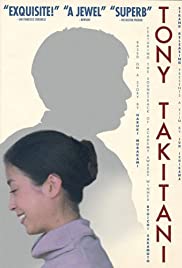
TONY TAKITANI/ TONI TAKITANI
Japan, 2004, 85 minutes, Colour.
Issei Ogata, Rie Mayazawa, Shinohara Takahumi, narrated by Hidetoshi Nishihijima.
Directed by Jun Ichikawa.
- The title, the focus on Tony? As a boy? Growing up? Adult? His relationship with his father? His profession? The attraction to the young woman, marrying her? The consequences and her extravagance?
- The setting, the initial visuals of Japan, pre-war, the war, aftermath? The context for Tony’s father, jazz musician, career, China, survival, woes? Neglect of his son?
- The portrait of the boy growing up, postwar Japan, the boy, education, talents?
- Adult Tony, technical design, his work, a loner, the attraction of the young woman, fashion, the dresses, her obsession? Tony marrying her, the consequences?
- The wife, younger, shopping, extravagance, leaving?
- Tony, in middle age, life experiences, disappointments, persevering?
Songbird
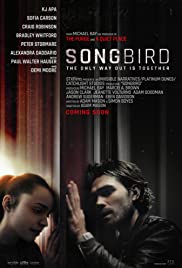
SONGBIRD
US, 2020, 84 minutes, Colour.
KJ Apa, Sofia Carson, Craig Robinson, Bradley Whitford, Peter Stormare, Lia Mc Hugh, Paul Walter Hauser, Demi Moore.
Directed by Adam Mason.
Songbird was released at the end of 2020. Presumably production took place during the year, the filmmakers experiencing coronavirus, the seemingly sudden pandemic, experiences of lockdown, and found this action thriller through having nightmares – or, at least, transferring them to their computers for a nightmarish plot, and the question as to how long the pandemic would last. They decided that it would be still with us in 2024, devastating Los Angeles, the wealthy surviving in lockdown luxury, those with Covid 23 (alarming information in itself) gathered by the government Department of Sanitation and relegated to a huge walled quarantine area.
So, an early movie contribution to the Covid 19 experience.
And, stirred into the screenplay are a romance, brutal behaviour by sanitation officials, a racket to provide immune bands to those prepared to pay. Plenty of melodramatic ingredients.
The romance is quite lively, especially with KJ Apa as Nicky, starting as a law student but forced by the pandemic to be a courier for a huge, Amazon -like company which delivers packages on order, which arrive at their destination, go into a sanitising box, retrieved by the customers. GPS, phones, drones ensure security. Nick is in love with Sarah (Sofia Carson) who is in lockdown with her Grammy figure, who does succumb to Covid 23. Nicky would like to get Sarah an immune band, he himself being immune and free to cycle around the Los Angeles Hills as courier.
The main villain of the piece is played by Peter Storemare (originally from Sweden but becoming one of the most regular villains on the American screen). By default, he has become the chief of sanitation, imperious and sadistic. But, he is also involved in the racket for providing the false immune bands. This is run by a wealthy family, the husband rather ruthless (Bradley Whitford) also involved with a singer whose career has been cut short (Alexandra Daddario). The singer is online with the controller of drones, Paul Walter Hauser, wheelchair bound but who saves the day for her. The wife, Demi Moore, cares for their sick young daughter but is also involved in the racket. Nicky is referred to them. Which, of course, provides quite a deal of action, doubledealing, betrayals, confrontations, fights.
This is the kind of entertainment that was produced very quickly, not intended to be high art, nor even subtle. It’s the kind of pastime romantic thriller that one might watch in lockdown or on a slow night.
- 2020 and the covid epidemic, the drama reflecting this, especially lockdown and its conditions, taking it further, three more years, covert 23?
- Los Angeles setting, the overviews of the city, the deserted freeways, barriers for cars, couriers, the companies sending parcels, their being sanitised? Lockdown, affluent homes and apartments? The sanitation officials? The glimpse of the quarantine area, the strict enclosure?
- The title? Clues? Characters? Songs and performance?
- Nico’s story, immune, his age, studying law, the pandemic, his job as a courier, his bike, speed, charm, the customers, his love for Sarah, concerned for her and her grandmother? Working with Lester? With Mike Dozer and his surveillance, drones? His wanting to get immunity for Sarah? The contacts, Lester’s advice, going to the Griffins, the confrontation with William, Piper giving him an address, sending him to Harland, the audience knowing his work and sanitation? The conflict, stabbing, the officials in pursuit, the intervention of the lone action man? Nico’s escape, contacting Piper, persuading her, getting the immunity card, Lester and Mike tracking Sarah? Going to the apartment, Harland present, the previous fight, the confrontation, the gift of the pencils for art, stabbing Harland? At the gates, slipping on the immunity band, Sarah being verified – and happy ending and escape? On the bike along the California coast?
- Sarah’s story, with her Grammy, Lita, memories of her mother? Surviving lockdown? The bonding with Nico, phones, images, texting? Lita, Sarah helping, dying, the sanitation people coming, Sarah hiding, getting the uniform, in the ambulance, the confrontation with Harland? Nico arriving, immune, safe?
- The Griffins, their affluence, the young daughter and her illness, her mother’s care? Their business, getting immunity cards, high prices? William, going to visit May, lying to Piper, the sexual encounters? Piper watching him? William phoning May, his demands, her wanting to escape, checking with Mike, the car not starting, William at the car, Mike and the drone, killing him? Her escape, meeting up with Mike? Her career as a singer?
- Mike, war service, in the wheelchair, surveillance, loner, friendship with Lester? The surveillance of the couriers? The drones? The contact with May, her songs for him, their talking? Rescuing her?
- Lester, the warehouse, the contacts, the couriers, efficient? Informing Piper about Nico? Helping Nico at the end?
- Happy ending? Piper collaborating against her husband, saving her daughter?
- The image of epidemics in the future, the extent of lockdown, government control, Department of sanitation, the immune, the quarantine?
